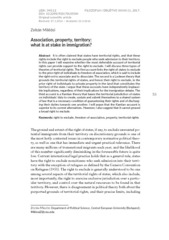Приказ основних података о документу
Association, property, territory: what is at stake in immigration?
Udruživanje, svojina i teritorija: o čemu govorimo kada govorimo o imigraciji?
| dc.creator | Miklósi, Zoltán | |
| dc.date.accessioned | 2018-03-18T20:13:46Z | |
| dc.date.available | 2018-03-18T20:13:46Z | |
| dc.date.issued | 2017 | |
| dc.identifier.issn | (Print) 0353-5738 | |
| dc.identifier.issn | (Online) 2334-8577 | |
| dc.identifier.uri | http://rifdt.instifdt.bg.ac.rs/123456789/1477 | |
| dc.description.abstract | It is often claimed that states have territorial rights, and that these rights include the right to exclude people who seek admission to their territory. In this paper I will examine whether the most defensible account of territorial rights can provide support to the right to exclude. I will discuss three types of theories of territorial rights. The first account links the right of states to exclude to the prior right of individuals to freedom of association, which is said to include the right not to associate and to dissociate. The second is a Lockean theory that grounds the territorial rights of states, and hence their right to exclude, in the prior right of individuals to private property in the land that constitutes the territory of the state. I argue that these accounts have independently implausible implications, regardless of their implications for the immigration debate. The third account is a Kantian theory that bases the territorial jurisdiction of states on individuals’ duty to create, sustain and submit themselves to a shared system of law that is a necessary condition of guaranteeing their rights and of discharging their duties towards one another. I will argue that the Kantian account is superior to its current alternatives. However, I also suggest that it cannot ground a broad right to exclude. | en |
| dc.description.abstract | Često se tvrdi da države imaju teritorijalna prava, odnosno da ta prava podrazumevaju i pravo na isključivanje ljudi koji bi želeli da budu primljeni u teritorije pojedinih država. U ovom članku ćemo proučavati pitanje da li najviše odbranjiva teza o teritorijalnim pravima može da pruži podršku isključivanju. Analiziraću tri tipa teorije o teritorijalnim pravima. Prva teorija povezuje pravo država na isključivanje sa osnovnijem pravom pojedinica na udruživanje. Druga teorija je lokovska teorija u kojoj se teritorijalna prava država, uključujući pravo na isključivanje, baziraju na osnovnijem pravu pojedinaca na privatnu svojinu na zemlji koja konstituiše teritoriju države. Tvrdim da ove teorije imaju posledice koje nisu plauzibilne, bez obzira na njihove implikacije u odnosu na rasprave o imigraciji. Treća teorija je kantijanska teorija koja se zasniva na teritorijalnoj jurisdikciji država, imajući u vidu obaveze pojedinaca u stvaranju i održavanju pravnog sistema koji je nužni uslov u garantovanju njihovih prava, odnosno u pogledu izvršavanja njihovih obaveza. Moja teza je da je kantijanska teorija superiorna u odnosu na njene alternative, zatim da se pomoću nje ne može zasnivati šire pravo na isključivanje. | sr |
| dc.language.iso | en | sr |
| dc.publisher | Beograd : Institut za filozofiju i društvenu teoriju | sr |
| dc.rights | openAccess | sr |
| dc.rights.uri | https://creativecommons.org/licenses/by-nc-nd/4.0/ | |
| dc.source | Filozofija i društvo/Philosophy and Society | sr |
| dc.subject | right to exclude | sr |
| dc.subject | freedom of association | sr |
| dc.subject | territorial rights | sr |
| dc.subject | property | sr |
| dc.subject | pravo na isključivanje | sr |
| dc.subject | sloboda udruživanja | sr |
| dc.subject | svojina | sr |
| dc.subject | teritorijalna prava | sr |
| dc.title | Association, property, territory: what is at stake in immigration? | en |
| dc.title | Udruživanje, svojina i teritorija: o čemu govorimo kada govorimo o imigraciji? | sr |
| dc.type | article | sr |
| dc.rights.license | BY-NC-ND | sr |
| dcterms.abstract | Миклóси, Золтáн; | |
| dc.citation.issue | 1 | |
| dc.citation.volume | 28 | |
| dc.citation.spage | 53 | |
| dc.citation.epage | 73 | |
| dc.citation.epage | ||
| dc.identifier.doi | 10.2298/FID1701053M | |
| dc.type.version | publishedVersion | sr |
| dc.identifier.fulltext | http://rifdt.instifdt.bg.ac.rs/bitstream/id/2948/ZoltanMilosi.pdf | |
| dc.identifier.wos | 000408375800005 |

